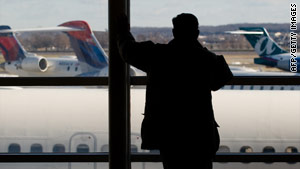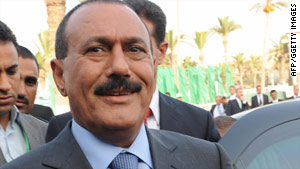A 'lucky to be alive' passenger's story
By David Schilke, Special to CNN
January 1, 2010 -- Updated 1232 GMT (2032 HKT)
Editor's note: David Schilke and his family were passengers on Flight 253. He and his wife Iliana work for Ford Motor Co. The following is from an e-mail he plans to send his co-workers on January 4.
(CNN) -- As most of you already know my wife, my son and I were on "that plane" on Christmas Day. We had ringside seats. In order to keep myself from going crazy (repeating everything about everything over and over again) I am writing this e-mail. The therapeutic value of writing things down and staring at the words over and over again after such an event should also not be overlooked.
Please, that definitely does NOT mean that you can't come by and say hi, ask how we are doing, ask other questions or just stare at one of the luckiest persons you'll ever know. Stop by if you wish, any time. The only thing you are absolutely forbidden to ask me about is work.
So, here goes.
The most important thing:
My family and I are still here and so are 275 other people -- so it didn't turn out so badly after all.
The facts:
The guy was on the left side of the plane, window seat, aisle 19. We were two rows back and I was four seats, plus an aisle, sideways from the guy. My son was next to me (on the aisle) and my wife was across the aisle from him.
About 15 minutes before landing -- tray tables up, chairs forward, strapped in -- most everyone heard a pop, very much like a New Year's Eve popper. I immediately poked my head up. I thought the sound had come from ahead of me but I saw a flight attendant standing in our aisle about four or five rows up looking straight across to the other side of the plane. Her eyes were wide open staring over in what proved to be the generally correct direction.
I watched her and looked around for people who might be looking back or over towards a particular location. But neither the flight attendant, presumably, nor I could locate the origin of the pop and a lot of people weren't staring towards one particular area of the plane.
She gave up, presumably, and continued down the aisle. I slumped back into my chair. I then was thinking that it was a child with a balloon or some not-very-intelligent person popping a bag. It had been a good 10 or so seconds since the pop.
Some people over on the other side of the plane suddenly started yelling "fire" and "smoke." My head popped up again. I could see smoke -- not a lot -- rising from a set of two window/aisle chairs on the opposite side of the plane a couple rows up. I could see an orange reflection -- no flames -- low on the cabin walls. People were yelling for water.
After a short time I unbuckled my belt, stood up and stared over at aisle 19, the left window seat. There was one person to stare at because his neighbor had fled. People continued yelling "fire" and "water." People around the guy, and others who had water, started pouring water on his lap and the seat. The flight attendants started yelling for fire extinguishers. The fire continued but always was just a reflection off the cabin walls. Once or twice I looked up at the smoke -- it was never more then a small smoke trail rising up from the area and spreading out over a few rows in each direction. I could just barely smell the smoke.
Before the fire extinguishers arrived, a fellow on our side of the plane, about three rows up in a window seat, jumped out of his seat and over the middle four seats towards the suspect. He grabbed at the suspect and after a very short period of time had dragged him out of his seat to the floor. Less than a minute after the initial pop, two flight attendants ran up the aisle with fire extinguishers and doused the seat and presumably the suspect. The fire and smoke were gone at this point.
The suspect was dragged up to the first-class section by the guy from our side of the plane. We did not see the suspect again until he was removed by police after landing. We clapped twice during the flight. Once when the guy from our side of the plane came back to sit down and again when we landed.
My recollections may not exactly correspond to others that you may have heard or read -- a person can only watch and record so many things in a short period of time and different aspects of an event are more or less important to different people. I would say that my recollections are very accurate as far as the smoke, the fire and the suspect are concerned.
I may not be recollecting exactly who said what and when, exactly what people said ("water" or "we need water," etc.), how many people poured water and from what direction, who moved from somewhere to assist (except for the fellow mentioned above), what happened to the suspect after he was pulled from his seat onto the floor, exactly how he was removed from his seat, etc.
My wife stated that she did hear people screaming. I was focused on one area of the plane and only heard things going on in that area ("water," "bring fire extinguishers," etc.). There may have been screaming going on (which would imply some measure of panic) but I didn't realize it.
The suspect: I remember staring at him for "long" periods of time (many seconds). I could very clearly see his face. He never moved. He never turned his head. He never spoke a word or moved his lips. He never struggled. He never stopped anybody from pouring water on him. His expression was completely emotionless.
The aftermath: After the suspect was moved to the front of the plane we quickly landed and moved to a gate -- about 15 minutes or so later. During this time my wife's attention -- and mine -- were on our son. He is 5 years old, and the questions from him were non-stop. We answered his questions calmly and as accurately as necessary without lying. He was pretty good about things, maybe because a 3-foot-9-inch person strapped in his seat couldn't possibly see anything of consequence in this case.
His expression was completely emotionless.
--David Schilke
The flight attendants had to yell at a couple of passengers who felt that it was absolutely necessary to remove items from the overhead bins.
The police came aboard and quickly got the suspect off the plane. We waited another few minutes before we were allowed to depart. I did not get a good look at the remains of the fire (wrong side of the plane). We went into the international luggage pick-up area of the terminal and remained there for about five hours or so.
We heard that other people were forced to sit on planes on the runways for hours, so sitting in the luggage area was not so bad after all. For some reason we were moved to the hall between the gate and the luggage area for about 20 or 30 minutes and then back to the luggage area again. We had our carry-on belongings with us the whole time.
Dogs were brought in to sniff through the carry-on luggage. The conclusion of our stay in the luggage area was an interview with the FBI. (about a half hour for us). My wife was interviewed by a herd of reporters as we exited the international terminal. During the bus ride to our car, I kissed my wife and bid her a Merry Christmas.
Until we started viewing the events on TV, many of us thought that this was some amateur-hour idiot or some suicidal moron looking for a little publicity. We have since learned that we got lucky, very lucky. This person and his handlers wanted and expected chaos, panic and mayhem.
Two common questions that we were asked over the next few days from various reporters and commentators:
1) Were you scared? If you asked my wife, she would say "yes" because for awhile, during that minute or so after the pop, she thought that the explosion and fire might cause a hole in the side of the plane that would decompress it.
If you asked me, I would say "no." I never saw any chaos or panic (perhaps controlled chaos, at worse). The flames were always very low, never rising high enough for me to actually see them even while standing (just that orange glow on the cabin walls). The smoke never got thick.
People cried out about the fire and smoke (as they should). They cried out for water and fire extinguishers. The water was poured on the fire. The fire extinguishers were brought over and the fire was extinguished. The suspect never moved or spoke. He didn't try to scream at us. He didn't try to run out of his seat to possibly spread the fire. He didn't try to fight being removed from his seat. I watched and never got concerned to the point of being scared for me or for my son or wife.
Perhaps if I had actually seen flames that went higher and higher; perhaps if there had been more smoke; perhaps if other explosions had occurred; perhaps if the suspect had tried to move about while on fire, or had screamed at us, or had tried to fight back in any way; perhaps if people around me had been screaming -- then I probably would have been scared.
2) Will you fly again? Soon: We have to fly again in January. There is absolutely nothing that will keep us from flying in January. Nothing.
Later: We have enjoyed traveling the world and I expect we will continue to do so in the future.
...
We were not supposed to be on the Christmas Day flight from Amsterdam to Detroit. Our original itinerary was: December 23 - Moscow to Amsterdam, staying overnight in Amsterdam and December 24 - Amsterdam to Detroit.
On December 23, we started out for the Moscow airport 4-1/2 hours before the flight, which is normally way more than enough time to go the required 25-30 miles.
Traffic was horrible that day (weather, accidents) and we made it to the airport about 1/2 hour after the flight left. We stayed at an airport hotel in Moscow on December 23, flew from Moscow to Amsterdam on the December 24 and took the fated flight from Amsterdam to Detroit on December 25, a day late.
...
Some other things I have thought of in the week since Christmas:
The suspect would have just sat in his seat and slowly, and quietly, gone up in flames if nobody had done anything.
He paid cash. How nice.
Maybe we, and others, will keep an eye on each other next time. Walk around and watch people. Look into the eyes of strangers and determine if we like what we see.
Between that Reid guy and this guy (and others?), "they" will keep trying until they "get it right." When they do get it right, it won't be pretty.
...
My quote of a lifetime:
"I would rather have days where I am happy to be alive as opposed to days where I am lucky to be alive."
The opinions expressed in this commentary are solely those of David Schilke.







